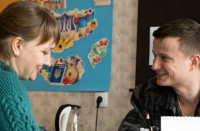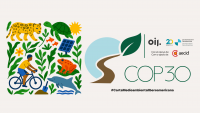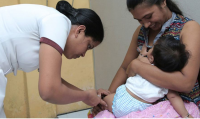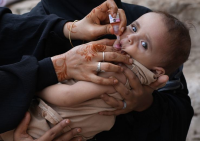You are here
News
-
09/03/2025 - More than half a million people in Gaza are trapped in famine, marked by widespread starvation, destitution and preventable deaths, according to a new Integrated Food Security Phase Classification (IPC) analysis.
-
09/03/2025 - More than 1 billion people are living with mental health disorders, according to new data released by the World Health Organization (WHO), with conditions such as anxiety and depression inflicting immense human and economic tolls. While many countries have bolstered their mental health policies and programmes, greater investment and action are needed globally to scale up services to protect and promote people’s mental health.
-
08/26/2025 - The "Young Innovators for the Environment in Ibero-America" program seeks to identify innovative initiatives related to the four pillars of the Ibero-American Environmental Charter. Registration or submission of initiatives is open until August 30.
-
08/22/2025 - The Pan American Health Organization (PAHO) is urging countries in the Americas to strengthen immunization activities, enhance disease surveillance and rapid response interventions, as measles cases continue to rise in the region. As of 8 August 2025, a total of 10,139 confirmed measles cases and 18 related deaths have been reported across ten countries, representing a 34-fold increase compared to the same period in 2024.
-
08/07/2025 - The number of users to register for courses on the Pan American Health Organization’s (PAHO) Virtual Campus for Public Health (VCPH) has surpassed 4 million, underscoring the platform’s role as a vital tool for the training of health personnel in the Region of the Americas.
-
08/07/2025 - The Pan American Health Organization (PAHO) has released its 2024 country annual reports, outlining the main results of technical cooperation carried out in collaboration with governments and strategic partners across the Americas. These reports highlight concrete results, inspiring stories from the field, and the impact of the Organization’s work on each country. “These reports showcase our collaboration with Member States to address shared challenges and promote equitable access to health,” said Dr. Jarbas Barbosa, PAHO Director. “The Organization is committed to impactful, transformative, and country-focused technical cooperation, tailored to countries’ priorities, needs, and capacities to address health risks and strengthen health systems,” he added.
-
07/29/2025 - While some progress and recovery have been made in recent years, the world is still above pre-COVID-19 pandemic levels and far from eradicating hunger and food insecurity by 2030 (SDG Target 2.1). Similarly, despite some progress in the global nutrition targets, the world is not on track to achieve SDG Target 2.2. Among other factors, persistent food price inflation has slowed this momentum.
-
07/28/2025 - As we mark World Hepatitis Day, WHO calls on governments and partners to urgently accelerate efforts to eliminate viral hepatitis as a public health threat and reduce liver cancer deaths. Viral hepatitis – types A, B, C, D, and E – are major causes of acute liver infection. Among these only hepatitis B, C, and D can lead to chronic infections that significantly increase the risk of cirrhosis, liver failure, or liver cancer. Yet most people with hepatitis don’t know they’re infected. Types B, C, and D affect over 300 million people globally and cause more than 1.3 million deaths each year, mainly from liver cirrhosis and cancer.
-
07/25/2025 - Childhood immunization in the Americas has shown encouraging signs of recovery in 2024, but significant gaps remain. According to new data released in July, 15, by the World Health Organization (WHO) and UNICEF, over 1.4 million children in the Americas did not receive a single dose of the diphtheria, tetanus, and pertussis (DTP)-containing vaccine, marking an increase in so-called “zero-dose” children.
-
07/23/2025 - Noncommunicable diseases (NCDs) and mental health conditions will cost South America over US$ 7.3 trillion in lost productivity and healthcare spending between 2020 and 2050, according to estimations in a new Pan American Health Organization (PAHO) report launched on July, 15. This figure—equivalent to the entire annual GDP of Latin America and the Caribbean—underscores an urgent economic and health emergency, and the need to act now to prevent disease and protect development










